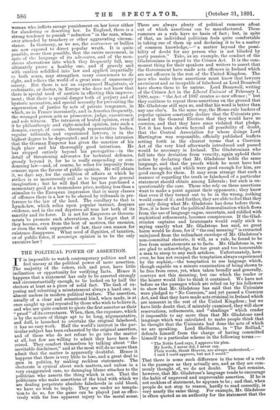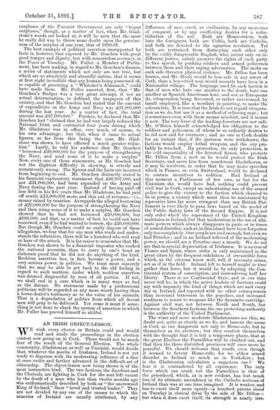THE POLITICAL POWER OF ASSERTION.
IT is impossible to watch contemporary politics and not feel uneasy at the political power of mere assertion. The majority of the voters, rich and poor, have little inclination or opportunity for verifying facts. Hence it happens that a statement has only to be asserted strongly and circumstantially enough, to be looked on by half the electors at least as a piece of solid fact. The task of ex- posing and rebutting a misstatement always a hard one, is almost useless in modern political warfare. The assertion, usually of a clear and sensational kind, when made, is at once caught up and repeated by those who wish to believe it, and who are quite content to quote the first assertor as their " proof " of its correctness. When, then, the exposure, which is by the nature of things apt to be long, argumentative, and dull, is launched to overtake the original falsehood, it has no easy work. Half the world's interest in the par- ticular subject has been exhausted by the original assertion, and of those who do not refuse to go into the matter at all, but few are willing to admit they have been de- ceived. They comfort themselves by talking about " the inevitable disclaimer," and at the most will do no more than admit that the matter is apparently doubtful. Hence it happens that there is very little to lose, and a great deal to gain in politics, by making reckless statements. The electorate is cynical about such matters, and unless in a very exaggerated case, no damaging blame attaches to the politician who asserts the thing which is not. That the politicians who make assertions of the kind with which we are dealing perpetrate absolute falsehoods in cold blood, we have no wish to imply. They are under no tempta- tion to do so, for the game can be played just as effec- tively with far less apparent injury to the moral sense. There are always plenty of political rumours afloat out of which assertions can be manufactured. These rumours as a rule have no basis of fact; but, in spite of that, an individual politician feels quite comfortable in taking one of them up and declaring it to be a matter of common knowledge,—" a matter beyond the possi- bility of doubt for any person who is not blinded by party passion." Take, as an example, the conduct of the Gladstonians in regard to the Crimes Act. It is the com- monest thing for their speakers and writers to assert that the Government have made acts offences in Ireland which are not offences in the rest of the United Kingdom. The men who make these assertions must know that lawyers as eminent and as incapable of falsehood as Lord Bramwell have shown them to be untrue. Lord Bramwell, writing of the Crimes Act in the Liberal Unionist of February 1, 1890, says : " the Act of 1887 creates no new offence ; " but they continue to repeat these assertions on the ground that Mr. Gladstone still says so, and that his word is better than any one else's. In the same way, the Home-rule leaders of popular opinion constantly declare that the Unionists pro- mised at the General Election that they would have no coercion, and that they have since violated that pledge. Yet it has been shown beyond all possibility of doubt, that the Central Association for whose doings Lord Hartington was responsible, officially published leaflets setting forth in the clearest terms that a Coercion Act of the very kind afterwards introduced and passed would be necessary in Ireland. The Gladstonians who fall into this deviation from veracity, again uphold their action by declaring that Mr. Gladstone holds the same language, and that the proofs which he must have had before he spoke, and which were good enough for him, are good enough for them. It may seem strange that such a manner of regarding the truth or falsehood of a particular statement should obtain among Liberals ; but such is un- questionably the case. Those who rely on these assertions want to make a point against their opponents ; they know that even if they turned out to be in the wrong, nothing would come of it ; and further, they are able to feel that they are only doing what Mr. Gladstone has done before them. Now, it is here that the political demoralisation which flows from the use of language vague, uncertain, and riddled with sophistical refinements, becomes conspicuous. If the Glad- stonian captains and lieutenants would really stick to saying exactly what Mr. Gladstone has said, no great harm would be done, for if " the real meaning " is extracted uninjured from the redundant envelope of Mr. Gladstone's non-committal rhetoric, it will, as a rule, be found to be free from misstatements as to facts. Mr. Gladstone is, we are glad to acknowledge, far too great and too honourable a man to stoop to any such artifices. Unfortunately, how- ever, he has not escaped the temptation always experienced by the sophist,—the temptation to use language which, though capable on a minute examination of being shown to be free from error, yet, when taken broadly and generally, conveys not this meaning, but one which the reader or the hearer would like to think it contained. We have not before us the passages which are relied on by his followers to show that Mr. Gladstone has said that the Unionists were pledged to " No Coercion," and yet passed a Coercion Act, and that they have made acts criminal in Ireland which are innocent in the rest of the United Kingdom; but we have little doubt that, if minutely examined, they will show reservations, refinements, and " shadings " which render it impossible to say more than that Mr. Gladstone used language which was calculated to make people think that he thought that the Unionists had done the acts of which we are speaking. Lord Shelburne, in " The Rolliad," defends himself from the charge of having committed himself to a particular scheme in the following terms :— " The Noble Lord says, I approve his plan. My Lords, I never did, I never can.
Plain words, thank Heaven, are always understood,—
I said I could approve, but not I would."
That there is some such difference in the tense of a verb in the passages as they actually are, and as they are com- monly thought of, we do not doubt. The fact remains, however, that Mr. Gladstone's language tends to encourage the habit of unproved and unproveable assertion. If he is not reckless of statement, he appears to be ; and that, when people do not stop to reason, hardly to read correctly, is very nearly the same thing. For example, Mr. Gladstone is often quoted as an authority for the statement that the surpluses of the Unionist Government are only "bogus surpluses," though, as a matter of fact, when Mr. Glad- stone's words are looked at, it will be seen that the most he really did was to throw some doubt upon the genuine- ness of the surplus of one year, that of 1890-91.
The best example of political assertion unsupported by facts is, however, that exposed by Mr. Goschen with great good temper and dignity, but with remorseless accuracy, in the Times of Tuesday. Mr. Fuller, a Member of Parlia- ment, has been making, in regard to Mr. Goschen's finance, a series of statements which not only are not true, but which are so absolutely and absurdly untrue, that it seems at first sight incredible that any human being possessed of, or capable of procuring a " Whitaker's Almanack," could have made them. Mr. Fuller asserted, first, that " Mr. Goschen's Budget was a very great attempt, if not an actual determination, to defraud the taxpayers of this country, and that Mr. Goschen had stated that the amount of expenditure on the Army and Navy was £31,000,000 during the last year. As a matter of fact, the total amount was £37,000,000." Further, he declared that Mr. Goschen had " claimed that he had very largely reduced the National Debt, and contrasted four years during which Mr. Gladstone was in office, very much, of course, to his own advantage ; but that, when it came to actual figures, so far from this being the case, Mr. Glad- stone was shown to have effected a much greater reduc- tion." Lastly, he told his audience that Mr. Goschen " borrowed £20,000,000 for the purpose of strengthening the Navy, and used some of it to make a surplus." Now, every one of these statements, as Mr. Goschen had not the slightest difficulty in showing, is utterly and monstrously wrong. The figures and the facts are incorrect from beginning to end. Mr. Goschen distinctly stated in his financial explanatory statement that £36,907,000, and not £31,000,000, had been expended on the Army and Navy during the past year. Instead of having paid off less debt in his five years than Mr. Gladstone, he had paid off nearly £13,000,000 more, and this out of revenue,—i.e., money raised by taxation. As regards the alleged borrowing of £20,000,000 for the purpose of strengthening the Navy and then using some of it to make a surplus, Mr. Goschen showed that he had not borrowed £20,000,000, but £696,000, and that, as a matter of fact, he could not have borrowed, even if he had wanted to borrow, the £20,000,000. But though Mr. Goschen could so easily dispose of these allegations, we fear that for one man who reads and under- stands the refutation, there will be a hundred who will read or hear of the attack. It is far easier to remember that Mr. Goschen was shown to be a financial impostor who cooked the national accounts, than to carry in one's head an elaborate proof that he did not do anything of the kind. Reckless assertion has, in fact, become a power, and a very serious power, in politics. We trust most sincerely that we may be able to get back to the old feeling in regard to such matters, under which reckless assertion was deemed disgraceful by men of all parties. If not, we shall end in a cure which is in many ways as bad as the disease. No statement made by a professional politician will be regarded as any more worth having than a horse-dealer's testimony as to the value of his animals. That is a degradation of politics from which all decent men will pray to be delivered. Yet come it must if some- thing is not done to check the system of assertion in which Mr. Fuller has proved himself so skilful.



































 Previous page
Previous page